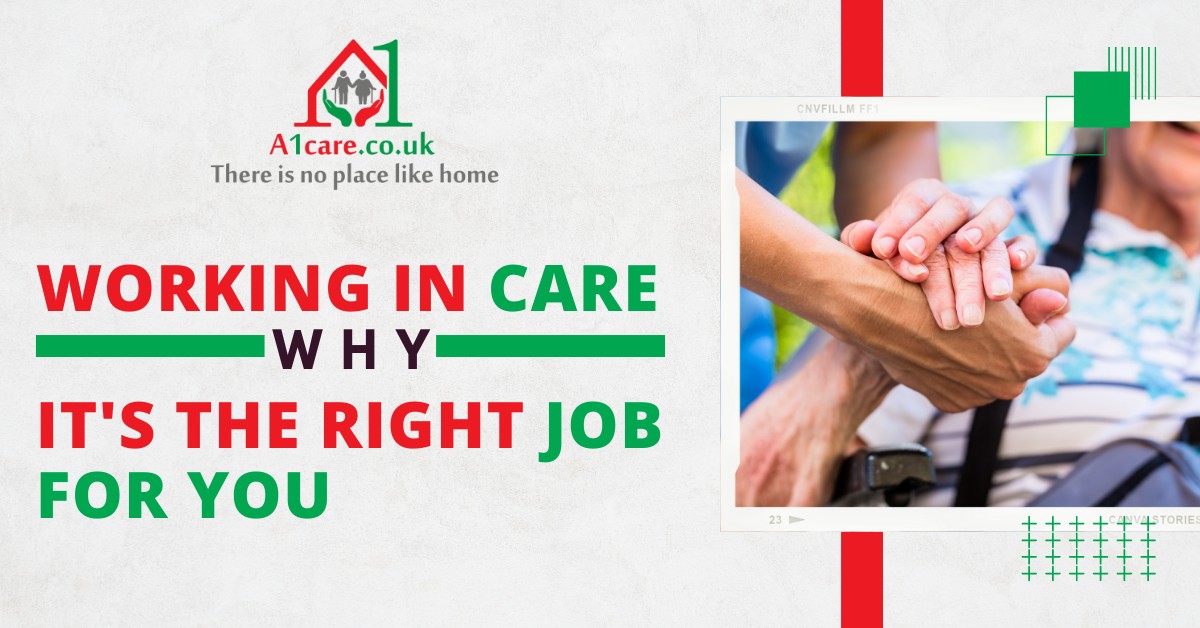Have you ever thought about working in care? Carers make up a large workforce population, with 1 in 8 people being a carer.
At A1 Care, we believe that it is the most important job a person can have. As a carer, you are the reason why someone’s life has drastically changed for the better.
Most jobs don’t have that kind of satisfaction!
If this sounds like the job for you, keep reading to find out what it’s like working in care.
Working in Care
If you’re unfamiliar with the world of care, you might be unsure what a carer actually does. This all depends on whether you’re talking about live-in care or domiciliary care. Let’s start with live-in care. A live-in carer will live with the service user 24/7, with breaks. It’s really as simple as it sounds. The carer will need to adapt and be flexible with the service clients needs, as they will have a routine they’re used to.
However, this is not to say that every day will be the same. Some service users still need help attending social events or even going to the shops to get their weekly shopping done. Medication administration is an essential service within live-in care; you’ll also be their companion to combat loneliness.
Domiciliary care is when a carer travels to various service users each day. How much time you spend with the client will vary depending on their needs and/or their families wishes. For example, you might only visit one client for an hour or two to give them their dinner and do some cleaning. Whereas with another client, it may be 3 or 4 hours as you have more tasks to complete.
The responsibilities of a carer will depend entirely on the client’s needs.
However, here are some key duties:
- Personal care, such as showering, dressing, and toileting
- Housekeeping and domestic duties
- Companionship
- Palliative care
Care for couples - Assistance in events, shopping, and/or social gatherings
- Medication management and administration
- Mental health needs
- Welfare checks
A carer will also be trained to provide Parkinson’s, after stroke, dementia care, and other specialized disabilities. Approximately 21 million people in the UK know a close friend or family member who is suffering from dementia. This is roughly 42% of the population (based on psnc.org.uk ). So it is very likely that you will have to take care of someone with dementia. Working with someone suffering from dementia can be incredibly challenging as it does take an emotional toll, but knowing you are making their life better makes it all worth it.
Being a carer comes with great benefits.
Benefits of Working in Care
Working in care can be one of the most rewarding jobs possible. 98% of live-in care clients say that the care and support they receive from care services help them to have a better quality of life.
Knowing that you can have such a positive impact on someone’s life is incredible. Without the work you do as a carer, this would not be possible. This also means that as a carer, you have fantastic job satisfaction. You will be improving someone’s life dramatically. Did your previous job allow you to change someone’s life for the better? This is a typical day for a carer. Another benefit is that no two days are the same.
One day you might be looking after a client with dementia, and the next day you might be looking after an elderly couple. Each client will have different needs and personalities, so you will never get bored. Even if you are a live-in carer, the service user you’re looking after will have different needs each day. One day they might want to go shopping or to a community event, and the next might be a relaxing day at home.
There is never a dull day as a carer! You will also be able to progress in your career.
As you take on more responsibilities as a carer, you will work your way up the ladder.
You don’t want to be stuck in the same position for the rest of your life, and we don’t want that either!
At A1 Care, we pride ourselves on mentoring you and facilitating this progression.
Joining the Team
Over the next 30 years, the number of carers will increase by 3.4 million. This is because the age group most in need of care, the over 85’s, is also increasing. The number of people over 85 in the UK is estimated to increase by over 50% over the next decade. (based on psnc.org.uk )
This means that there has never been a better time to become a carer! A1 Care covers the areas of Bournemouth, Wareham, and Lisburn.
If you live in the area and are considering a career in care, get in contact with us today!
At A1 Care, we have several services, including live-in care and domiciliary care, so we’ve got you covered whichever route you want to take. All our carers share the same values, which makes us such a great team. We are caring, empathetic, dedicated, and committed to providing the best care possible.
Does this sound like you?
If so, you would be a perfect fit for our team!
We have some great benefits including:
- Excellent rates of pay
- Paid holiday
- Pension scheme
- Career progression
We also provide in-house training, but we will cover that more-in depth next. At A1 Care, we consider ourselves a family, and so, we look out for each other. If you felt that you were struggling or just needed someone to talk to, we are always there to help our teammates. We take care of our staff, we understand your needs and work hard to meet them.
We provide in-house training if you need extra or just quickly refresh your memory on how something is done, and you can even join with no experience.
Training
At A1 Care we understand the importance of proper training. This is why we provide paid training, including a Care Certificate. E-learning isn’t practical for everyone, so we have our in-house trainers who are on hand for all your training needs. We also have a qualified Care Certificate Assessor whose job is to guide you through the Care Certificate and provide ongoing support throughout your personal and professional development. When you join the A1 team, you will have to complete an induction program so that you’re fully prepared for life as a carer.
What does this involve?
The induction program covers the following topics:
- Medication management
- Infection control
- Food hygiene
- Personal and pressure care
- Dementia
- Fire safety
- Communication
- Nutrition and fluids
- First aid
- Moving and handling
- Person-centered care
- Health and safety
- Equality and diversity
- Mental capacity act
- Risk assessment
- End of life
At first glance, this might seem like a lot, but it is all necessary to build up your confidence as a carer. We will continue to monitor your progress as your career goes on, so you know you’re becoming the best carer! You can find our A1 jobs vacancies here (You can also directly apply)
If you have questions, get in contact with us today.
Or, if you’re still unsure, check out our jobs website page to see all the great work we do and how we can help you.



